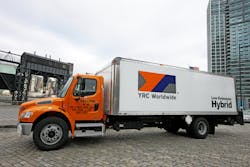Second quarter earnings reports from a variety of large carriers show that freight volumes are slowing, even as revenues and earnings stay stable or improve, largely due to rate increases.
For example, LTL carrier Con-way Freight noted that tonnage per day stayed relatively flat in the second quarter this year, increasing just 0.9% compared to the same period in 2011. Yet its revenues increased 4.6% to $878.5 million, with operating income rising 36.5% to $53.4 million due to continued price improvement, operating efficiency and cost control.
Indeed, Douglas Stotlar, president and CEO of Con-way Inc. – Con-way Freight’s parent company – noted that the all-important yields metric, denoted profit margins, at its LTL division increased to 3.2% both with and without inclusion of the carrier’s fuel surcharge.
“Our second quarter performance reflected disciplined operations which increased profit levels at all business units … enabling Con-way Freight to successfully expand margins over last year," he added in a statement.
“Reduced empty miles and higher revenue per loaded mile contributed to an improved operating ratio,” Stotlar pointed out. “We remain focused on operational excellence and premium service as our foundation for further margin expansion.”
LTL carrier ABF noted that its daily tonnage levels in the second quarter continued to be below those of the same period last year, though during each month the second quarter this year, the level of tonnage decrease improved versus 2011.
Yet the carrier significantly boosted its revenues and profits as part of what Judy McReynolds, president and CEO of ABF’s parent company Arkansas Best, called “an aggressive initiative” to address inadequate pricing and improve the profitability of many accounts across ABF’s network.
ABF posted net income of $11.8 million on revenue of $511 million in the second quarter, compared with net income of $5.3 million on revenue of $499 million in the same period last year. A 6.9% increase in its general rates and charges that went into effect June 25 is also part of the carrier’s ongoing effort to obtain price increases on ABF accounts under contract, McReynolds noted.
“This effort continues in 2012 and, as a result, the incremental profitability of ABF's account base has improved,” she said in the company’s second quarter earnings report. “While we are encouraged by ABF's yield initiatives, we continue to focus on various paths to reduce ABF's overall cost structure.”
Kevin Knight, chairman and CEO of Knight Transportation, also noted that similar pricing initiatives in the TL sector helped offset reduced demand for capacity.
“Supply and demand were relatively balanced and resulted in less spot pricing opportunities, as compared to the same period last year,” he said in the carrier’s earnings report. “Our average revenue per total mile, excluding fuel surcharges, increased 2.1% in the second quarter when compared to the same period last year even as average revenue per tractor declined slightly as higher rates were offset by lower utilization per truck.”
Yet Knight posted net income of $19.3 million on 3.4% higher total revenue of $236.3 million in the second quarter this year versus net income of $16.4 million on total revenues of $228.5 million in the same period of 2011 – all despite lower tractor utilization.
''We are pleased with the performance of our asset-based businesses,” Knight added. “Most notably, our dry van business achieved an operating ratio improvement of 320 basis points on a year over year basis and our port and rail services business improved their operating ratio 740 basis points from the first quarter of 2012.”
YRC Worldwide noted in its second quarter report an interesting divergence in freight demand as well, with its Regional Transportation division posting 7% higher operating revenues of $429.8 million on a 4.4% increase in tonnage per day and 2.5% jump in shipments per day, while its larger LTL operation, YRC Freight, witnessed a 0.7% drop in operating revenues to $821.1 million as tonnage per day declined 3.3% and shipments per day dropped 2.1%.
Interesting, despite those freight declines, YRC Freight said revenue per hundredweight increased 2.9% and revenue per shipment inched up 1.7%.
"YRC Freight is actively managing its customer mix with improved pricing discipline,” noted James Welch, YRC Worldwide’s CEO. “[That] is resulting in both sequential and year-over-year yield improvement despite the slight decrease in operating revenues.”
About the Author
Sean Kilcarr
Editor in Chief
Sean Kilcarr is a former longtime FleetOwner senior editor who wrote for the publication from 2000 to 2018. He served as editor-in-chief from 2017 to 2018.
